Psychology Report: Nature, Approaches, and Ethical Implications
VerifiedAdded on 2020/10/22
|8
|1889
|160
Report
AI Summary
This report provides a comprehensive overview of the field of psychology, beginning with a definition of its nature and purpose, which is to analyze, predict, and manage behavioral and mental characteristics. It then delves into the major theoretical approaches, including biological, behavioral, humanistic, cognitive, and psychodynamic perspectives, highlighting their key concepts, strengths, and weaknesses. The report further examines the ethical implications of psychological research, particularly in areas like social learning theory, emphasizing the importance of avoiding harm, maintaining confidentiality, and obtaining informed consent from participants. The conclusion reiterates the significance of psychology in understanding and influencing human behavior and development, and also highlights the importance of ethical considerations in this field. The report draws upon various sources, including books, journals, and online resources, to support its analysis and conclusions.

PSYCHOLOGY
Paraphrase This Document
Need a fresh take? Get an instant paraphrase of this document with our AI Paraphraser
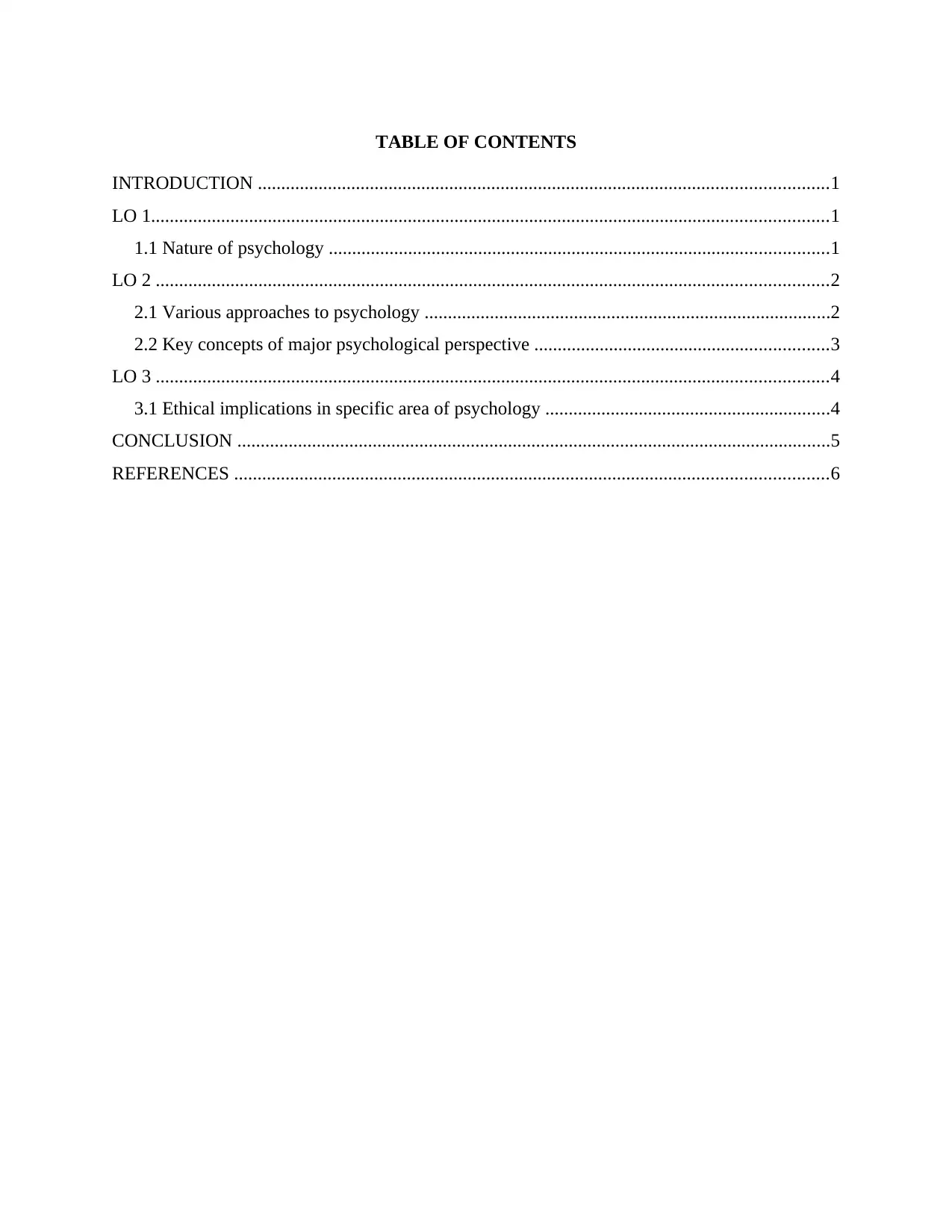
TABLE OF CONTENTS
INTRODUCTION ..........................................................................................................................1
LO 1.................................................................................................................................................1
1.1 Nature of psychology ...........................................................................................................1
LO 2 ................................................................................................................................................2
2.1 Various approaches to psychology .......................................................................................2
2.2 Key concepts of major psychological perspective ...............................................................3
LO 3 ................................................................................................................................................4
3.1 Ethical implications in specific area of psychology .............................................................4
CONCLUSION ...............................................................................................................................5
REFERENCES ...............................................................................................................................6
INTRODUCTION ..........................................................................................................................1
LO 1.................................................................................................................................................1
1.1 Nature of psychology ...........................................................................................................1
LO 2 ................................................................................................................................................2
2.1 Various approaches to psychology .......................................................................................2
2.2 Key concepts of major psychological perspective ...............................................................3
LO 3 ................................................................................................................................................4
3.1 Ethical implications in specific area of psychology .............................................................4
CONCLUSION ...............................................................................................................................5
REFERENCES ...............................................................................................................................6
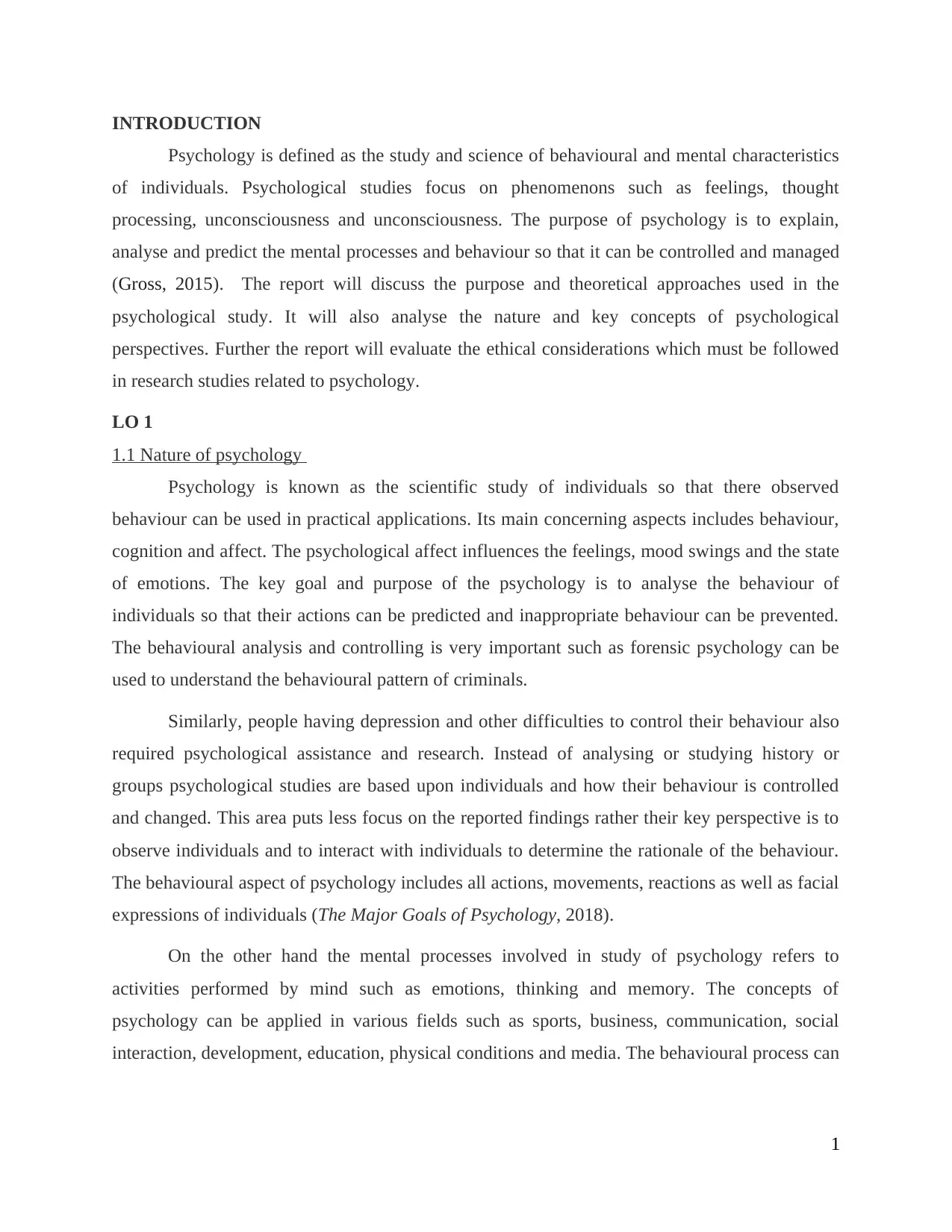
INTRODUCTION
Psychology is defined as the study and science of behavioural and mental characteristics
of individuals. Psychological studies focus on phenomenons such as feelings, thought
processing, unconsciousness and unconsciousness. The purpose of psychology is to explain,
analyse and predict the mental processes and behaviour so that it can be controlled and managed
(Gross, 2015). The report will discuss the purpose and theoretical approaches used in the
psychological study. It will also analyse the nature and key concepts of psychological
perspectives. Further the report will evaluate the ethical considerations which must be followed
in research studies related to psychology.
LO 1
1.1 Nature of psychology
Psychology is known as the scientific study of individuals so that there observed
behaviour can be used in practical applications. Its main concerning aspects includes behaviour,
cognition and affect. The psychological affect influences the feelings, mood swings and the state
of emotions. The key goal and purpose of the psychology is to analyse the behaviour of
individuals so that their actions can be predicted and inappropriate behaviour can be prevented.
The behavioural analysis and controlling is very important such as forensic psychology can be
used to understand the behavioural pattern of criminals.
Similarly, people having depression and other difficulties to control their behaviour also
required psychological assistance and research. Instead of analysing or studying history or
groups psychological studies are based upon individuals and how their behaviour is controlled
and changed. This area puts less focus on the reported findings rather their key perspective is to
observe individuals and to interact with individuals to determine the rationale of the behaviour.
The behavioural aspect of psychology includes all actions, movements, reactions as well as facial
expressions of individuals (The Major Goals of Psychology, 2018).
On the other hand the mental processes involved in study of psychology refers to
activities performed by mind such as emotions, thinking and memory. The concepts of
psychology can be applied in various fields such as sports, business, communication, social
interaction, development, education, physical conditions and media. The behavioural process can
1
Psychology is defined as the study and science of behavioural and mental characteristics
of individuals. Psychological studies focus on phenomenons such as feelings, thought
processing, unconsciousness and unconsciousness. The purpose of psychology is to explain,
analyse and predict the mental processes and behaviour so that it can be controlled and managed
(Gross, 2015). The report will discuss the purpose and theoretical approaches used in the
psychological study. It will also analyse the nature and key concepts of psychological
perspectives. Further the report will evaluate the ethical considerations which must be followed
in research studies related to psychology.
LO 1
1.1 Nature of psychology
Psychology is known as the scientific study of individuals so that there observed
behaviour can be used in practical applications. Its main concerning aspects includes behaviour,
cognition and affect. The psychological affect influences the feelings, mood swings and the state
of emotions. The key goal and purpose of the psychology is to analyse the behaviour of
individuals so that their actions can be predicted and inappropriate behaviour can be prevented.
The behavioural analysis and controlling is very important such as forensic psychology can be
used to understand the behavioural pattern of criminals.
Similarly, people having depression and other difficulties to control their behaviour also
required psychological assistance and research. Instead of analysing or studying history or
groups psychological studies are based upon individuals and how their behaviour is controlled
and changed. This area puts less focus on the reported findings rather their key perspective is to
observe individuals and to interact with individuals to determine the rationale of the behaviour.
The behavioural aspect of psychology includes all actions, movements, reactions as well as facial
expressions of individuals (The Major Goals of Psychology, 2018).
On the other hand the mental processes involved in study of psychology refers to
activities performed by mind such as emotions, thinking and memory. The concepts of
psychology can be applied in various fields such as sports, business, communication, social
interaction, development, education, physical conditions and media. The behavioural process can
1
⊘ This is a preview!⊘
Do you want full access?
Subscribe today to unlock all pages.

Trusted by 1+ million students worldwide
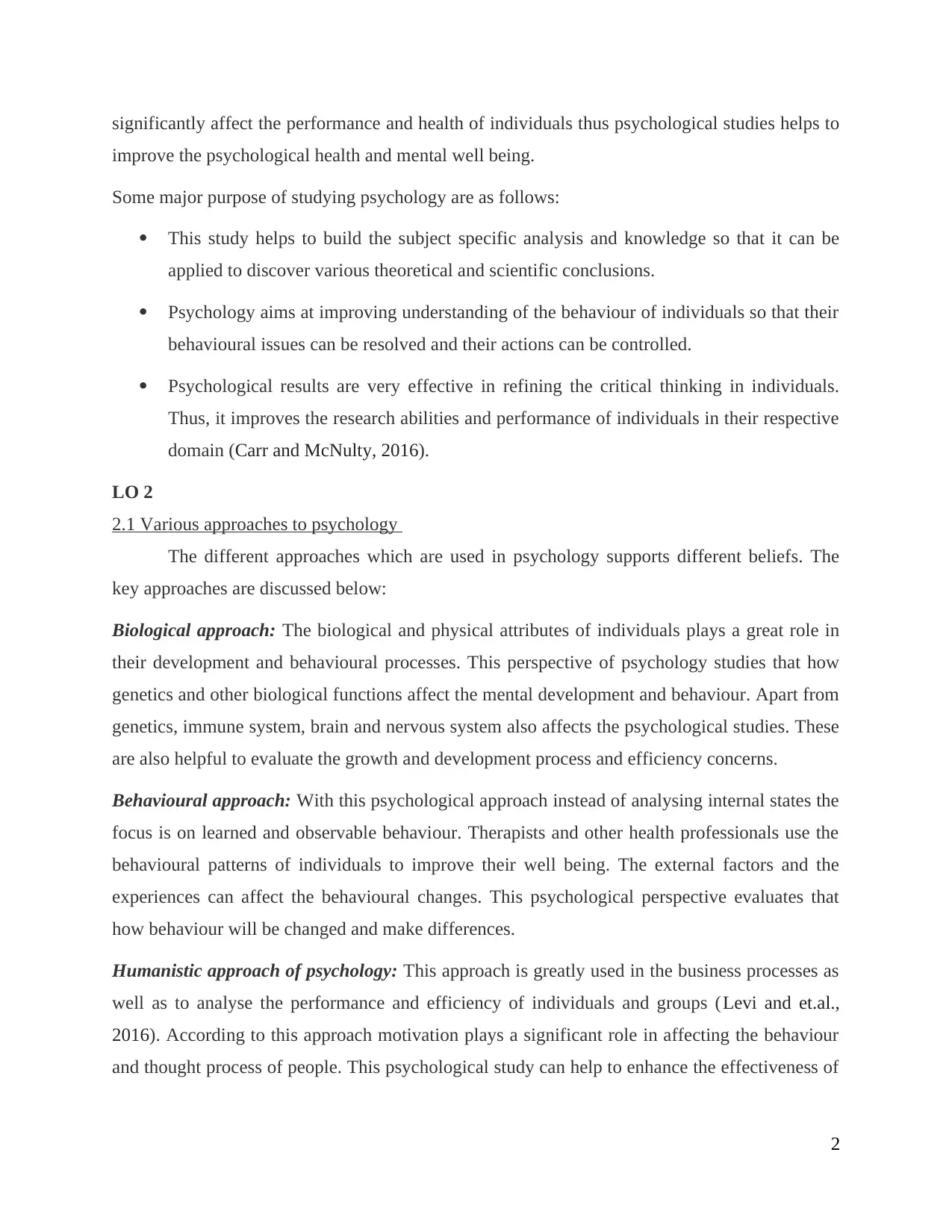
significantly affect the performance and health of individuals thus psychological studies helps to
improve the psychological health and mental well being.
Some major purpose of studying psychology are as follows:
This study helps to build the subject specific analysis and knowledge so that it can be
applied to discover various theoretical and scientific conclusions.
Psychology aims at improving understanding of the behaviour of individuals so that their
behavioural issues can be resolved and their actions can be controlled.
Psychological results are very effective in refining the critical thinking in individuals.
Thus, it improves the research abilities and performance of individuals in their respective
domain (Carr and McNulty, 2016).
LO 2
2.1 Various approaches to psychology
The different approaches which are used in psychology supports different beliefs. The
key approaches are discussed below:
Biological approach: The biological and physical attributes of individuals plays a great role in
their development and behavioural processes. This perspective of psychology studies that how
genetics and other biological functions affect the mental development and behaviour. Apart from
genetics, immune system, brain and nervous system also affects the psychological studies. These
are also helpful to evaluate the growth and development process and efficiency concerns.
Behavioural approach: With this psychological approach instead of analysing internal states the
focus is on learned and observable behaviour. Therapists and other health professionals use the
behavioural patterns of individuals to improve their well being. The external factors and the
experiences can affect the behavioural changes. This psychological perspective evaluates that
how behaviour will be changed and make differences.
Humanistic approach of psychology: This approach is greatly used in the business processes as
well as to analyse the performance and efficiency of individuals and groups (Levi and et.al.,
2016). According to this approach motivation plays a significant role in affecting the behaviour
and thought process of people. This psychological study can help to enhance the effectiveness of
2
improve the psychological health and mental well being.
Some major purpose of studying psychology are as follows:
This study helps to build the subject specific analysis and knowledge so that it can be
applied to discover various theoretical and scientific conclusions.
Psychology aims at improving understanding of the behaviour of individuals so that their
behavioural issues can be resolved and their actions can be controlled.
Psychological results are very effective in refining the critical thinking in individuals.
Thus, it improves the research abilities and performance of individuals in their respective
domain (Carr and McNulty, 2016).
LO 2
2.1 Various approaches to psychology
The different approaches which are used in psychology supports different beliefs. The
key approaches are discussed below:
Biological approach: The biological and physical attributes of individuals plays a great role in
their development and behavioural processes. This perspective of psychology studies that how
genetics and other biological functions affect the mental development and behaviour. Apart from
genetics, immune system, brain and nervous system also affects the psychological studies. These
are also helpful to evaluate the growth and development process and efficiency concerns.
Behavioural approach: With this psychological approach instead of analysing internal states the
focus is on learned and observable behaviour. Therapists and other health professionals use the
behavioural patterns of individuals to improve their well being. The external factors and the
experiences can affect the behavioural changes. This psychological perspective evaluates that
how behaviour will be changed and make differences.
Humanistic approach of psychology: This approach is greatly used in the business processes as
well as to analyse the performance and efficiency of individuals and groups (Levi and et.al.,
2016). According to this approach motivation plays a significant role in affecting the behaviour
and thought process of people. This psychological study can help to enhance the effectiveness of
2
Paraphrase This Document
Need a fresh take? Get an instant paraphrase of this document with our AI Paraphraser
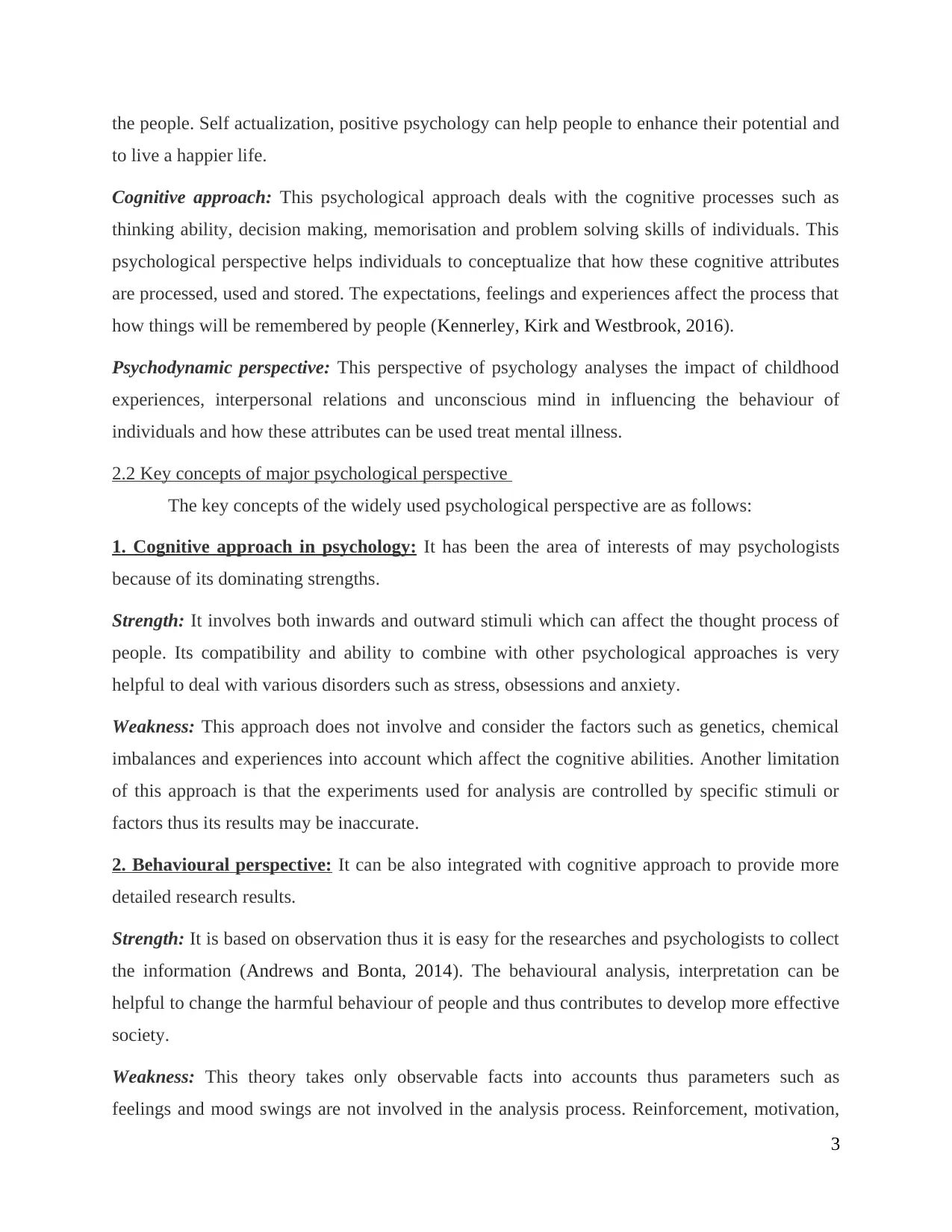
the people. Self actualization, positive psychology can help people to enhance their potential and
to live a happier life.
Cognitive approach: This psychological approach deals with the cognitive processes such as
thinking ability, decision making, memorisation and problem solving skills of individuals. This
psychological perspective helps individuals to conceptualize that how these cognitive attributes
are processed, used and stored. The expectations, feelings and experiences affect the process that
how things will be remembered by people (Kennerley, Kirk and Westbrook, 2016).
Psychodynamic perspective: This perspective of psychology analyses the impact of childhood
experiences, interpersonal relations and unconscious mind in influencing the behaviour of
individuals and how these attributes can be used treat mental illness.
2.2 Key concepts of major psychological perspective
The key concepts of the widely used psychological perspective are as follows:
1. Cognitive approach in psychology: It has been the area of interests of may psychologists
because of its dominating strengths.
Strength: It involves both inwards and outward stimuli which can affect the thought process of
people. Its compatibility and ability to combine with other psychological approaches is very
helpful to deal with various disorders such as stress, obsessions and anxiety.
Weakness: This approach does not involve and consider the factors such as genetics, chemical
imbalances and experiences into account which affect the cognitive abilities. Another limitation
of this approach is that the experiments used for analysis are controlled by specific stimuli or
factors thus its results may be inaccurate.
2. Behavioural perspective: It can be also integrated with cognitive approach to provide more
detailed research results.
Strength: It is based on observation thus it is easy for the researches and psychologists to collect
the information (Andrews and Bonta, 2014). The behavioural analysis, interpretation can be
helpful to change the harmful behaviour of people and thus contributes to develop more effective
society.
Weakness: This theory takes only observable facts into accounts thus parameters such as
feelings and mood swings are not involved in the analysis process. Reinforcement, motivation,
3
to live a happier life.
Cognitive approach: This psychological approach deals with the cognitive processes such as
thinking ability, decision making, memorisation and problem solving skills of individuals. This
psychological perspective helps individuals to conceptualize that how these cognitive attributes
are processed, used and stored. The expectations, feelings and experiences affect the process that
how things will be remembered by people (Kennerley, Kirk and Westbrook, 2016).
Psychodynamic perspective: This perspective of psychology analyses the impact of childhood
experiences, interpersonal relations and unconscious mind in influencing the behaviour of
individuals and how these attributes can be used treat mental illness.
2.2 Key concepts of major psychological perspective
The key concepts of the widely used psychological perspective are as follows:
1. Cognitive approach in psychology: It has been the area of interests of may psychologists
because of its dominating strengths.
Strength: It involves both inwards and outward stimuli which can affect the thought process of
people. Its compatibility and ability to combine with other psychological approaches is very
helpful to deal with various disorders such as stress, obsessions and anxiety.
Weakness: This approach does not involve and consider the factors such as genetics, chemical
imbalances and experiences into account which affect the cognitive abilities. Another limitation
of this approach is that the experiments used for analysis are controlled by specific stimuli or
factors thus its results may be inaccurate.
2. Behavioural perspective: It can be also integrated with cognitive approach to provide more
detailed research results.
Strength: It is based on observation thus it is easy for the researches and psychologists to collect
the information (Andrews and Bonta, 2014). The behavioural analysis, interpretation can be
helpful to change the harmful behaviour of people and thus contributes to develop more effective
society.
Weakness: This theory takes only observable facts into accounts thus parameters such as
feelings and mood swings are not involved in the analysis process. Reinforcement, motivation,
3
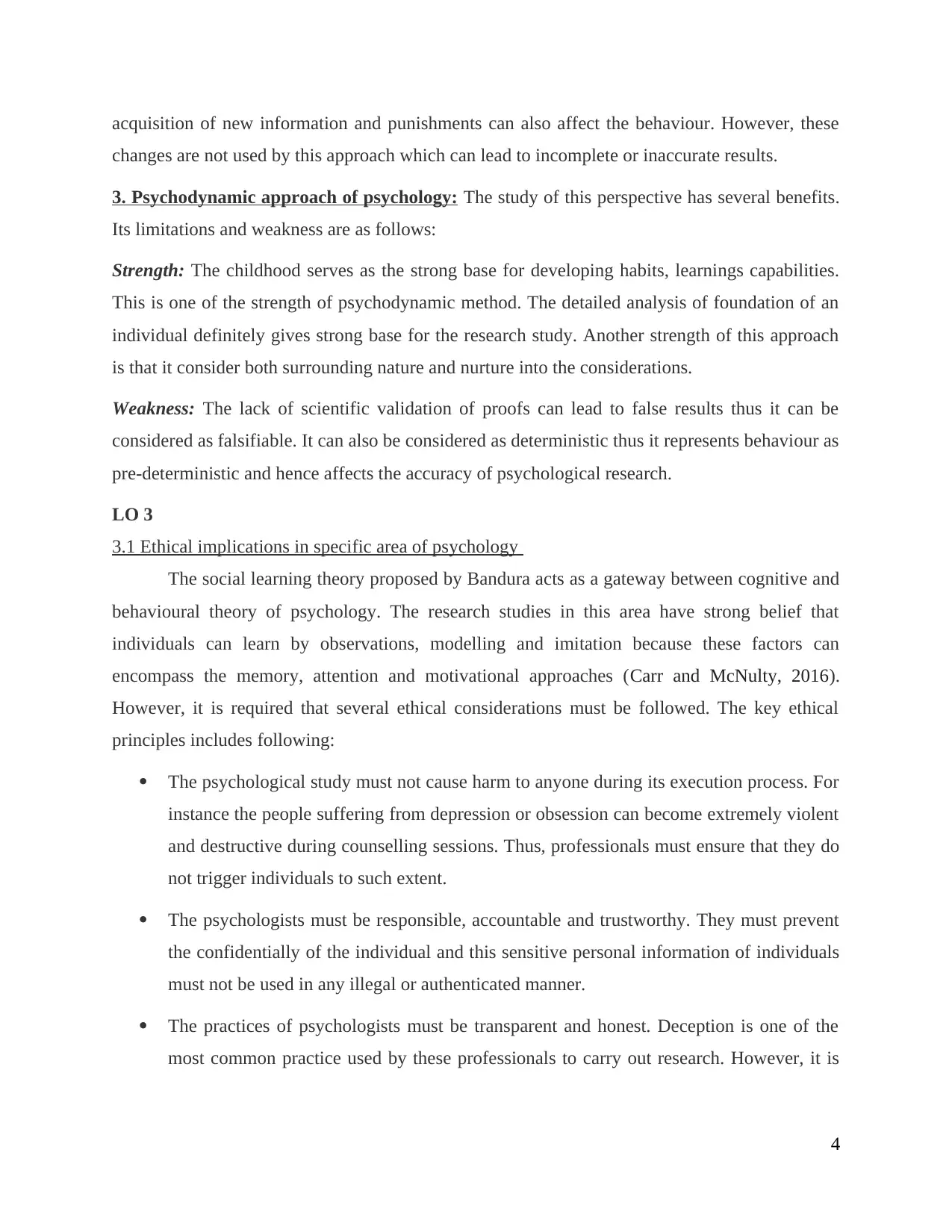
acquisition of new information and punishments can also affect the behaviour. However, these
changes are not used by this approach which can lead to incomplete or inaccurate results.
3. Psychodynamic approach of psychology: The study of this perspective has several benefits.
Its limitations and weakness are as follows:
Strength: The childhood serves as the strong base for developing habits, learnings capabilities.
This is one of the strength of psychodynamic method. The detailed analysis of foundation of an
individual definitely gives strong base for the research study. Another strength of this approach
is that it consider both surrounding nature and nurture into the considerations.
Weakness: The lack of scientific validation of proofs can lead to false results thus it can be
considered as falsifiable. It can also be considered as deterministic thus it represents behaviour as
pre-deterministic and hence affects the accuracy of psychological research.
LO 3
3.1 Ethical implications in specific area of psychology
The social learning theory proposed by Bandura acts as a gateway between cognitive and
behavioural theory of psychology. The research studies in this area have strong belief that
individuals can learn by observations, modelling and imitation because these factors can
encompass the memory, attention and motivational approaches (Carr and McNulty, 2016).
However, it is required that several ethical considerations must be followed. The key ethical
principles includes following:
The psychological study must not cause harm to anyone during its execution process. For
instance the people suffering from depression or obsession can become extremely violent
and destructive during counselling sessions. Thus, professionals must ensure that they do
not trigger individuals to such extent.
The psychologists must be responsible, accountable and trustworthy. They must prevent
the confidentially of the individual and this sensitive personal information of individuals
must not be used in any illegal or authenticated manner.
The practices of psychologists must be transparent and honest. Deception is one of the
most common practice used by these professionals to carry out research. However, it is
4
changes are not used by this approach which can lead to incomplete or inaccurate results.
3. Psychodynamic approach of psychology: The study of this perspective has several benefits.
Its limitations and weakness are as follows:
Strength: The childhood serves as the strong base for developing habits, learnings capabilities.
This is one of the strength of psychodynamic method. The detailed analysis of foundation of an
individual definitely gives strong base for the research study. Another strength of this approach
is that it consider both surrounding nature and nurture into the considerations.
Weakness: The lack of scientific validation of proofs can lead to false results thus it can be
considered as falsifiable. It can also be considered as deterministic thus it represents behaviour as
pre-deterministic and hence affects the accuracy of psychological research.
LO 3
3.1 Ethical implications in specific area of psychology
The social learning theory proposed by Bandura acts as a gateway between cognitive and
behavioural theory of psychology. The research studies in this area have strong belief that
individuals can learn by observations, modelling and imitation because these factors can
encompass the memory, attention and motivational approaches (Carr and McNulty, 2016).
However, it is required that several ethical considerations must be followed. The key ethical
principles includes following:
The psychological study must not cause harm to anyone during its execution process. For
instance the people suffering from depression or obsession can become extremely violent
and destructive during counselling sessions. Thus, professionals must ensure that they do
not trigger individuals to such extent.
The psychologists must be responsible, accountable and trustworthy. They must prevent
the confidentially of the individual and this sensitive personal information of individuals
must not be used in any illegal or authenticated manner.
The practices of psychologists must be transparent and honest. Deception is one of the
most common practice used by these professionals to carry out research. However, it is
4
⊘ This is a preview!⊘
Do you want full access?
Subscribe today to unlock all pages.

Trusted by 1+ million students worldwide
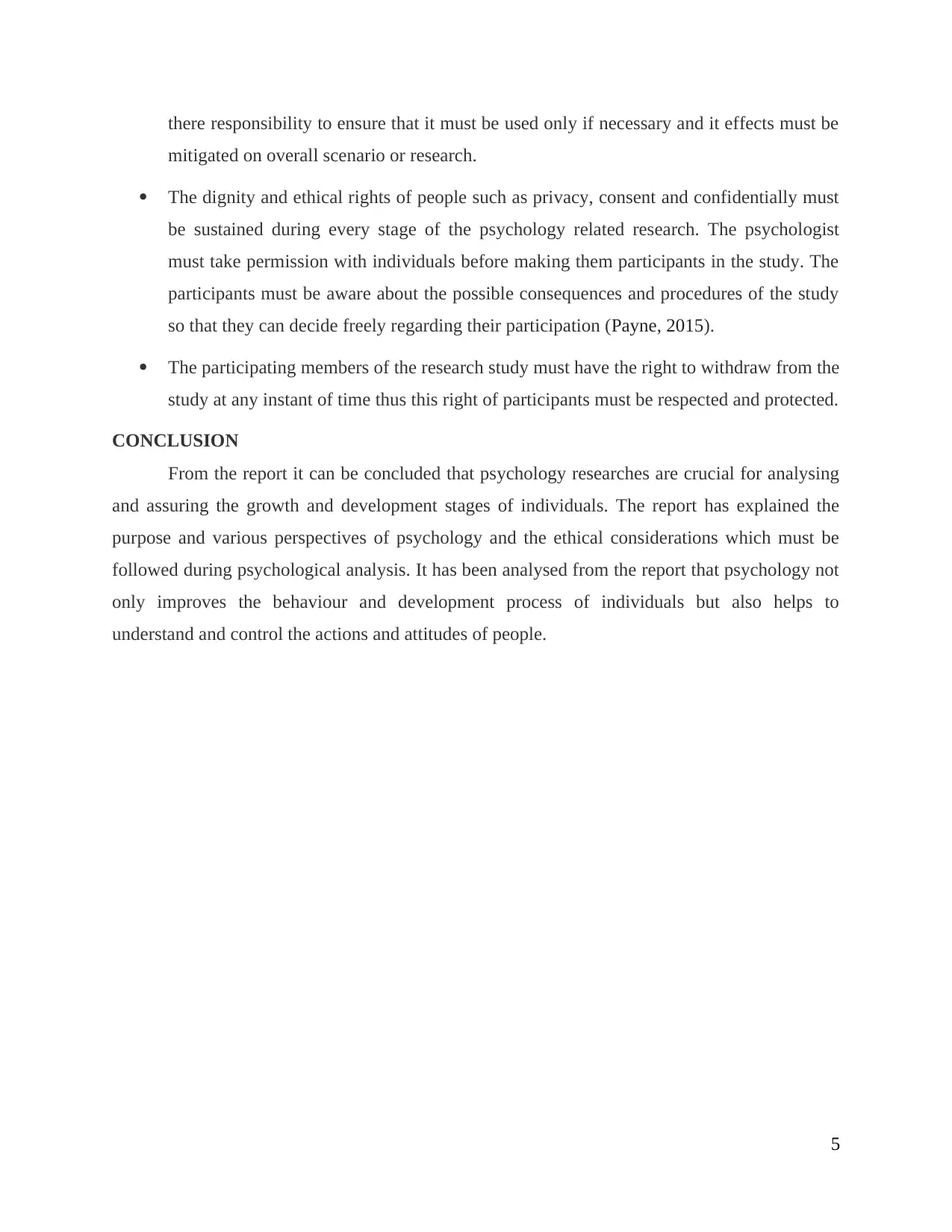
there responsibility to ensure that it must be used only if necessary and it effects must be
mitigated on overall scenario or research.
The dignity and ethical rights of people such as privacy, consent and confidentially must
be sustained during every stage of the psychology related research. The psychologist
must take permission with individuals before making them participants in the study. The
participants must be aware about the possible consequences and procedures of the study
so that they can decide freely regarding their participation (Payne, 2015).
The participating members of the research study must have the right to withdraw from the
study at any instant of time thus this right of participants must be respected and protected.
CONCLUSION
From the report it can be concluded that psychology researches are crucial for analysing
and assuring the growth and development stages of individuals. The report has explained the
purpose and various perspectives of psychology and the ethical considerations which must be
followed during psychological analysis. It has been analysed from the report that psychology not
only improves the behaviour and development process of individuals but also helps to
understand and control the actions and attitudes of people.
5
mitigated on overall scenario or research.
The dignity and ethical rights of people such as privacy, consent and confidentially must
be sustained during every stage of the psychology related research. The psychologist
must take permission with individuals before making them participants in the study. The
participants must be aware about the possible consequences and procedures of the study
so that they can decide freely regarding their participation (Payne, 2015).
The participating members of the research study must have the right to withdraw from the
study at any instant of time thus this right of participants must be respected and protected.
CONCLUSION
From the report it can be concluded that psychology researches are crucial for analysing
and assuring the growth and development stages of individuals. The report has explained the
purpose and various perspectives of psychology and the ethical considerations which must be
followed during psychological analysis. It has been analysed from the report that psychology not
only improves the behaviour and development process of individuals but also helps to
understand and control the actions and attitudes of people.
5
Paraphrase This Document
Need a fresh take? Get an instant paraphrase of this document with our AI Paraphraser
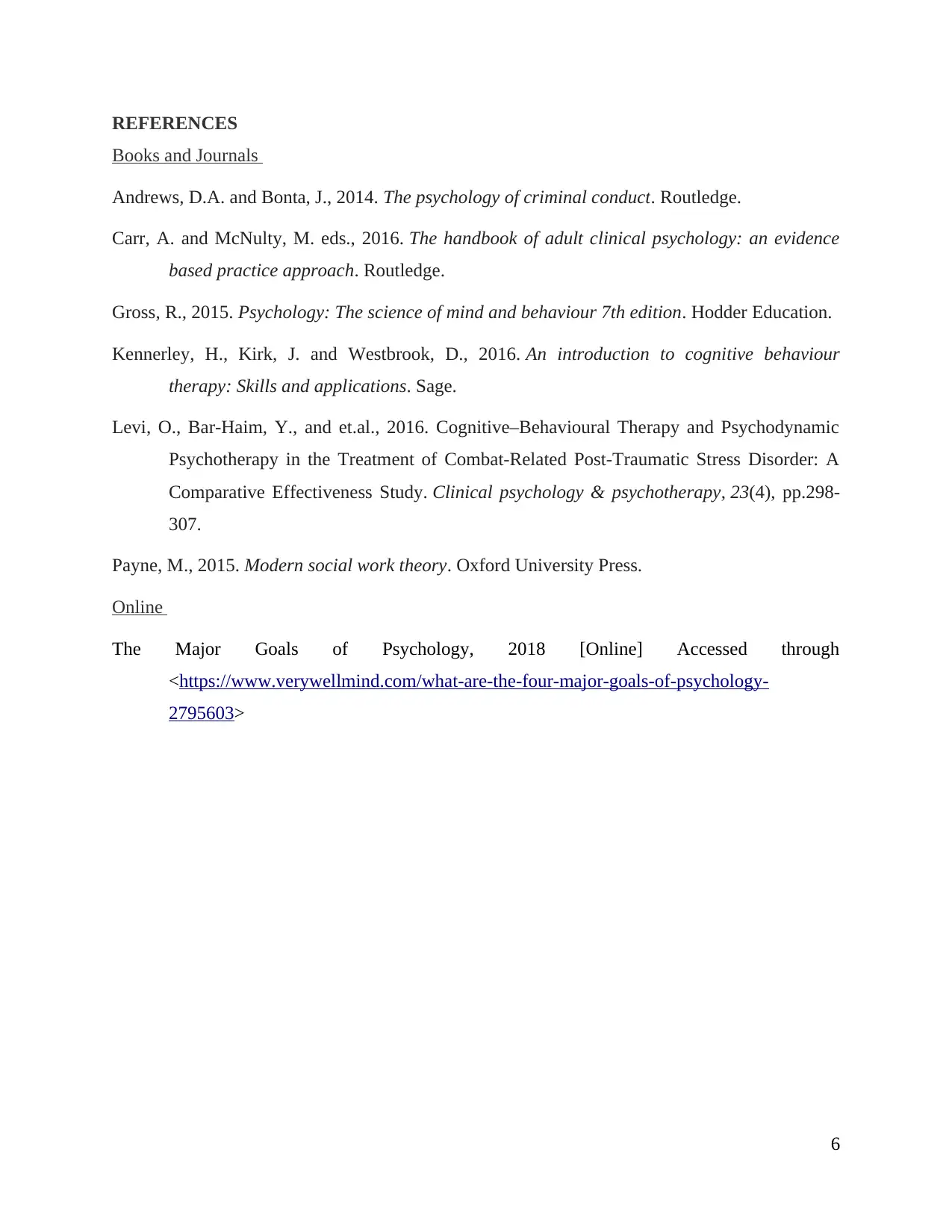
REFERENCES
Books and Journals
Andrews, D.A. and Bonta, J., 2014. The psychology of criminal conduct. Routledge.
Carr, A. and McNulty, M. eds., 2016. The handbook of adult clinical psychology: an evidence
based practice approach. Routledge.
Gross, R., 2015. Psychology: The science of mind and behaviour 7th edition. Hodder Education.
Kennerley, H., Kirk, J. and Westbrook, D., 2016. An introduction to cognitive behaviour
therapy: Skills and applications. Sage.
Levi, O., Bar‐Haim, Y., and et.al., 2016. Cognitive–Behavioural Therapy and Psychodynamic
Psychotherapy in the Treatment of Combat‐Related Post‐Traumatic Stress Disorder: A
Comparative Effectiveness Study. Clinical psychology & psychotherapy, 23(4), pp.298-
307.
Payne, M., 2015. Modern social work theory. Oxford University Press.
Online
The Major Goals of Psychology, 2018 [Online] Accessed through
<https://www.verywellmind.com/what-are-the-four-major-goals-of-psychology-
2795603>
6
Books and Journals
Andrews, D.A. and Bonta, J., 2014. The psychology of criminal conduct. Routledge.
Carr, A. and McNulty, M. eds., 2016. The handbook of adult clinical psychology: an evidence
based practice approach. Routledge.
Gross, R., 2015. Psychology: The science of mind and behaviour 7th edition. Hodder Education.
Kennerley, H., Kirk, J. and Westbrook, D., 2016. An introduction to cognitive behaviour
therapy: Skills and applications. Sage.
Levi, O., Bar‐Haim, Y., and et.al., 2016. Cognitive–Behavioural Therapy and Psychodynamic
Psychotherapy in the Treatment of Combat‐Related Post‐Traumatic Stress Disorder: A
Comparative Effectiveness Study. Clinical psychology & psychotherapy, 23(4), pp.298-
307.
Payne, M., 2015. Modern social work theory. Oxford University Press.
Online
The Major Goals of Psychology, 2018 [Online] Accessed through
<https://www.verywellmind.com/what-are-the-four-major-goals-of-psychology-
2795603>
6
1 out of 8
Related Documents
Your All-in-One AI-Powered Toolkit for Academic Success.
+13062052269
info@desklib.com
Available 24*7 on WhatsApp / Email
![[object Object]](/_next/static/media/star-bottom.7253800d.svg)
Unlock your academic potential
Copyright © 2020–2025 A2Z Services. All Rights Reserved. Developed and managed by ZUCOL.





